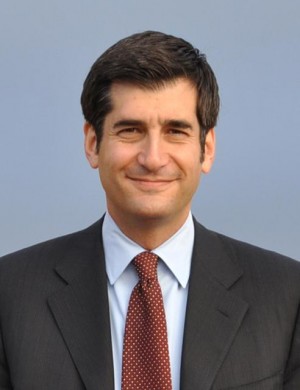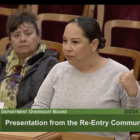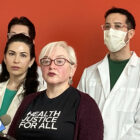Second interview is with David Onek
One of the more important and most overlooked races going on in San Francisco right now is the campaign to be the city’s next district attorney.
When Kamala Harris left the post for state office last year, outgoing Mayor Gavin Newsom appointed then-Police Chief George Gascon to take her place. Now, Gascon is running for a full four-year term, but faces stiff competition from four other candidates.
Yesterday, we spoke with Bill Fazio. Today, we turn to David Onek, a longtime criminal justice reformer and founding director of the Center for Criminal Justice at U.C. Berkeley’s School of Law.
Q:Just give me a little bit of your background.
A: I am somebody who’s been working to reform the criminal justice system for the last 20 years. My very first job was at Walden House, counseling kids in the juvenile justice system who had mental health and substance abuse issues. After I graduated from Stanford Law School, I worked at Legal Services for Children, providing free legal services to low-income kids in San Francisco. So I really come from a community and advocacy background. I’ve also worked for some of the leading criminal justice reform agencies in the country, like the National Counsel for Crime and Delinquency, where during the Clinton administration I helped write the book on implementing juvenile justice reform for the Clinton justice department. And have also worked for the W. Haywood Burns Institute for juvenile justice fairness and equity, which focuses on the overrepresentation of youth of color in our criminal justice system and how we can change policies and practices to make the system fairer for youth of color and for all youth. From there I went on to the Mayor’s Office of Criminal Justice. And was appointed to the San Francisco Police Commission and worked very closely with law enforcement. And then I brought it all together at the Berkeley Center for Criminal Justice which I founded at Berkeley Law School with the mission of bringing law enforcement and community together to build collaboration around pragmatic criminal justice reforms. That’s really what my whole career has been about and that’s what this campaign is about.
Q: So this campaign is for district attorney, which is considered one of the top law enforcement positions in the city. Just give a assessment of the state of public safety in San Francisco right now and what the biggest issues we face are.
A: Our criminal justice system is completely broken. We are spending so much on corrections in this state, on incarceration, that we’ve virtually bankrupted the state of California and were unable to pay for all the services that would actually make us safer, like more cops, community policing on the street, like more teachers in our schools, and more services in our communities. At the same time, 7 out of 10 people who come out of prison return within three years. The system is an incredibly expensive failure—so bad that the Supreme Court has declared it unconstitutional in an unprecedented decision. So we need to completely overhaul the system. And in order to do that, we need someone who knows how to reform the system to make it more effective and more fair, and that’s exactly what I’ve been doing for the last 20 years.
Q: So give me some concrete policies that you might implement upon entering office. What would your first policy priorities be?
A: So I’m going to focus on the juvenile justice system. Because we know what works is keeping young people from coming into the juvenile justice system in the first place. Because if you go into a prison and talk to people, the majority started as juveniles in the juvenile justice system. We had an opportunity to intervene with them then and we weren’t successful at getting them on the right path. So we need to make that the top priority and invest in kids. And I’m going to start a restorative justice program in the juvenile justice system. Restorative justice is a process that brings victims and offenders together. Unsurprisingly, victims give extremely high satisfaction rates to restorative justice because they are the center of the process and their voice is heard and central to the entire process. Versus the regular criminal justice system where unfortunately, victims often feel that they’re relegated to the side and their needs are not met. At the same time, for offenders, studies have shown that they have lower recidivism rates when they go through a restorative justice program. And again, this makes sense because if you’re hearing directly from another human being, on a one-to-one basis, about the effect that your actions had on that individual, that is going to do a much better job of changing you than the traditional, impersonal court system that where, because the stakes are so high, your attorney is rightfully telling you to deny, deny, deny, we have to fight these charges–and you’re not taking responsibility for your actions. It has higher victim satisfaction, offenders do much better, so it lowers crime, it lowers costs, it’s really a win-win.
Q: So you’ve been a reformer all your life, mostly about there’s too many people going to prison, the criminal justice system is overused. How would you feel about being in charge of and responsible for sending people to prison on a daily basis?
A: Well, we absolutely need to put serious and violent offenders in prison to protect our society. And that’s an important part of the DA’s job. At the same time, what we’re doing now is incarcerating lots of people who don’t need to be incarcerated at tremendous expense to society and again, it is keeping us from paying for the programs like education, like job training, like drug rehabilitation, things that keep people out of the criminal justice system in the first place. So we need to be much smarter. We need to focus our limited resources on serious and violent offenders and make sure we are removing them from our streets to keep us safer. At the same time, we need to offer opportunities for our lower level offenders to help them get on the right path, turn their lives around, so they don’t graduate to be the serious and violent offenders of tomorrow. Because that is what often happens. And so our priorities are often absolutely mixed up right now and we need to reverse that and that’s exactly what I’ll do as district attorney.
Q: So what does that mean? Does that mean dismissing drug possession cases? Not prosecuting drug sales, not prosecuting petty theft, what does that actually mean?
A: So let’s talk about drugs for a moment. The War on Drugs has been a complete failure. The Onion had a great line a few years ago, before it became more popular, which said “Drugs Win Drug War.” And I think that pretty much sums up where we are with the War on Drugs. Nobody can say it’s working. We need to do something different. And I absolutely will not be incarcerating people for low-level possession of drugs. It just doesn’t make sense. It’s wasting precious prison resources that should be going to serious and violent offenders. And you put someone in jail, you put someone in prison, they go back out without getting any treatment, they’re going to go back and do the same thing. So it makes no sense whatsoever. We need to provide treatment to folks who need it. We need to provide services for those with mental health needs. And help people stay on the right path. Locking people up because of an underlying mental health problem or underlying substance problem does not solve the problem whatsoever and is an extremely inefficient way to handle those problems. So I’m going to do things differently.
Q: So day one, coming into office, looking at your caseload, talking to your prosecutors, do you–without these kinds of programs in place already because they exist to some degree but not nearly to the degree that would be necessary—do you say we’re not prosecuting this, we’re just going to dismiss this or we’re going to put this person on probation?
A: Well, we do have excellent community based programs in San Francisco. We’re very fortunate to have really one of the most robust—unlike other counties that are dealing with this realignment issue that really don’t have local programming—we have excellent community based programs. And Walden House, where I used to work, is an excellent example of that. We have places like Delancey Street, where I work very closely with over the years, that have tremendous success rates in helping offenders, particularly people with drug problems, turn their lives around and get on the right path. I think the programs are there. However, we need to make sure, it is a real concern if we do not have adequate funding. And so I will absolutely fight for that and we need to capture savings that are made by reducing our prison population and ensure a portion of those savings are reinvested at the community level. I feel that as district attorney, I will be able to raise money for our non-profit partners. I think foundations that are thinking about what are going to be the investments that are going to pay off, will really want to look at a city that’s absolutely innovating, which is what San Francisco will be doing.
Q: So how do you feel about simultaneously managing this department of prosecutors who may or may not philosophically agree with some of your political views or views on the criminal justice system?
A: Well I think anyone who’s in the courts every day, who’s in the criminal justice system every day, knows the criminal justice system is completely broken and knows it needs to be reformed. I have some close friends and colleagues in the office who I’ve worked with for many, many years, whether it was when I was in the Mayor’s office or on the Police Commission, or one of my many other positions. And I think there are excellent, excellent attorneys in the DA’s office and I think they will absolutely thrive under my leadership, because I want to make their jobs easier. They have unbelievably difficult jobs right now trying to manage everything they’re trying to manage, with dwindling resources. And again, I want to change the system. And I want to change it in a way that will make their jobs more interesting and I’m really looking forward to working with the terrific team we already have in the DA’s office.
Q: So tell me a little about why you guys, you guys being you and Sharmin Bock and Bill Fazio, have really attacked George Gascon for being a police chief and for possibly having a conflict of interest in seeking and maintaining the DA’s office. Could you just explain that a little bit?
A: Sure. We’ve never had a police chief become district attorney, not only in the history of San Francisco, but in the history of our country. It has never happened. And there’s a very good reason for that because it’s a walking conflict of interest. I predicted it the minute the appointment happened and sure enough, within a few weeks we saw those conflicts clearly when allegations surfaced of officers on video doing illegal searches, allegedly, in Tenderloin SRO’s—single residence occupancies—where they said under oath that they had permission to go into the hotel rooms. The videos seem to show them barging in without consent. So innocent until proven guilty, the videos might not tell the whole story, we need to get all the facts, but certainly it doesn’t look good. And these are incidents that happened when George Gascon was the chief of police. He was their commanding officer, he was responsible for the training and supervision of these officers. So how in the world as district attorney can he possibly fairly investigate the department that he was in charge of? You can’t investigate yourself. And his refusal to have a conflict of interest policy where as a rule he recuses himself from these cases is somewhat mindboggling. Trust is absolutely broken when people think that the DA’s office or any part of law enforcement is not going to be fair. So I think it’s very troubling, we simply should not have a police chief in the DA’s office. I don’t care if it’s Mother Theresa. It doesn’t have to do with George. It has to do with anyone ever going from being police chief to a DA. It’s a conflict of interest.
This story was a joint effort of KALW News and the San Francisco Public Press.










